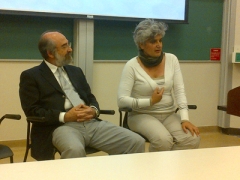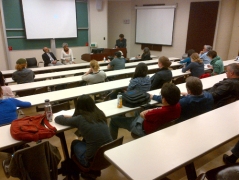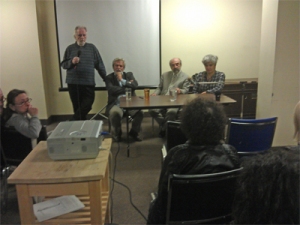(Ottawa) The situation around
Eldorado Gold Corporation’s mining projects in northern Greece is extremely tense. In the face of negative official response to social and environmental concerns from the company, Greek authorities, and even the Canadian Ambassador – a delegation from the affected area has come to ask Canadians for help.
The Canadian government strongly supports extractive resource development in Canada and internationally, where Canadian companies dominate the mining sector. It relies on “host” countries to regulate such operations in the absence of any relevant and binding international regulations. MiningWatch Canada spokesperson Jamie Kneen notes that the Greek delegation’s travel to Canada to appeal for support demonstrates just how weak this approach is, and how negative the effect is that Vancouver-based Eldorado Gold has had on the region.
“If people cannot count on basic democratic processes and legal protection in their own country, what can they do when Canada also refuses to implement the standards it has endorsed internationally, protecting human rights, labour rights, indigenous rights, and the environment?” says Kneen. “It’s appropriate that they appeal to the Canadian public for help, but in the 21st century it’s also pretty pathetic that it should come to this.”
The Greek delegation consists of Vaggelis Lampakis, the Mayor of Alexandroupoli, Thrace; Tolis Papageorgiou, of Halkidiki; and Maria Kadoglou, of
Hellenic Mining Watch (not affiliated with MiningWatch Canada). They are hoping to alert Canadians to the tension around Vancouver-based Eldorado’s proposed Skouries and Perama Hill mining projects, and to garner support for their work to stop the projects. The delegates have spent the last four days in Canada engaging with Members of Parliament, Eldorado Gold investors, and the Canadian public on how Eldorado’s proposed Skouries and Perama Hill mining projects are inappropriate for the region, which largely depends on agriculture and tourism and deteriorating the social fabric of the communities.
The group says the company has taken advantage of Greece’s economic crisis and support from the Greek government to push ahead in the face of massive public opposition - ironically, in the very birthplace of Aristotle.
The environmental assessment process for the Perama project has been suspended, despite the project’s “fast track” designation under Greek ‘austerity’ measures. The Skouries project has its general environmental approval but still requires specific permits for many aspects of its construction and operation, although Kadoglou says the company has started work without waiting for the needed permits.
“The Greek government and Eldorado Gold seem to have decided that the Skouries project will be imposed on the people of Halkidiki by force,” says Maria Kadoglou. “The mine site is surrounded by razor wire and our own Greek police are employed to prevent people from getting close to the site, even on public land and roads.”
Vaggelis Lampakis, the Mayor of Alexandroupoli, says Canadians - including Eldorado shareholders and the Canadian government - need to understand that Thracians are united in their opposition to the Perama project.
“We are talking about a million-tonne open pit cyanide heap-leach gold mine just 500 metres from the nearest village and 500 metres from the sea. We are open to investment, but there is no way this project can be acceptable. All 22 mayors from the region have pledged their opposition, and if they try to build this mine we will stand in front of the bulldozers,” he says.
The company argues that mining will be beneficial, providing much-needed employment, but does not recognise that the affected communities should have their own say in any development, rather than having it “fast-tracked” over their objection. “People know that mining jobs are well paid, but they are temporary and there’s almost always far fewer of them than promised,” says Jamie Kneen. “But the environmental and social damage is long term, and almost always far greater than promised.”
Meanwhile, the company is working as hard at winning the public relations battle as it is at mining. Kneen notes that, “Eldorado claims to have 1200 employees even when they’re only doing limited activities. It’s hard to avoid the conclusion that the company is trying to buy support, since most of these folks will be out of work again once the mines are actually operating. Only a few of them will have the skills required for mining.”
Mining is not new to northern Greece; it has been going on in Halkidiki for some 2500 years. “Mining in the area has always been small-scale and underground, but even this small-scale activity has left the area with a legacy of pollution,” notes Maria Kadoglou. “We are now talking about a huge expansion of mining, incompatible with the scale of the Halkidiki peninsula which is not a desert but a densely populated area with a rich natural environment and cultural history - and the third most popular tourist destination in the country.”
Adds Tolis Papageorgiou, “Our place is too small for this kind of development. It is not we who are saying ‘no’ to mining. It is the trees, the streams, the land itself that says ‘no’.”
The delegation also notes Canada’s increasingly negative international reputation, including the Canadian government's involvement through the Canadian embassy in Greece, funding from Export Development Canada and investments by public pension plans.
Kadoglou says, “We want the Canadian government to stop promoting these disastrous mining projects that are opposed by the local communities in Halkidiki and Thrace. Greek citizens should be able to decide what kind of future they want.”
Mayor Lampakis, Mr. Papageorgiou, and Ms. Kadoglou are making stops in Montreal, Ottawa, Toronto, and Vancouver during their time in Canada.
The tour is co-sponsored by the Council of Canadians, the Greek Canadian Committee for Ethical Mining, and the Pan-Thracian Society of Ontario.


















 This evening I heard Vaggelis Lampakis (the mayor of Alexandroupoli in the Thrace region of Greece) and Maria Kadoglou (an activist from the Halkidiki peninsula) speak at the University of Ottawa about mines being developed in their country by Vancouver-based Eldorado Gold. They were accompanied by Tolis Papageorgiou who is also from the Halkidiki peninsula.
This evening I heard Vaggelis Lampakis (the mayor of Alexandroupoli in the Thrace region of Greece) and Maria Kadoglou (an activist from the Halkidiki peninsula) speak at the University of Ottawa about mines being developed in their country by Vancouver-based Eldorado Gold. They were accompanied by Tolis Papageorgiou who is also from the Halkidiki peninsula. Maria spoke about the Skouries open-pit gold mine near the town of Ierissos. Her community has serious concerns about the mine consuming and polluting the scarce amount of water they have for drinking and for agriculture.
Maria spoke about the Skouries open-pit gold mine near the town of Ierissos. Her community has serious concerns about the mine consuming and polluting the scarce amount of water they have for drinking and for agriculture.
